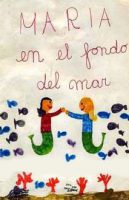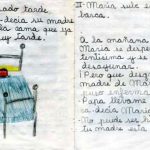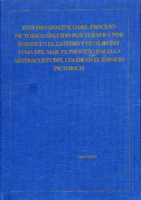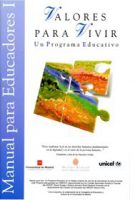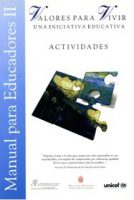Category: Other publications
Doctoral thesis
Analytical study of the pictorial process followed by turner and by homer in the study and painting of the subject of the sea the process towards the abstraction of colour in the pictorial space.
PhD thesis presented by: Miriam Subirana Vilanova
Supervised by: Dra. Teresa Moreno Rivero
Department of Processes of the Expression of Plastic Arts, Faculty of Fine Arts University of Barcelona September, 1991.
Textbook for teachers I. Values for living
Whatever our religious beliefs, or, simply, our ethical principles, our social and political ideas, we have to recognise that the value of life is a foundation for all the others. Nobody can dispose of the life of the other, and even less so the powers-that-be, which is why we unequivocally reject, at the turn of this century, the death penalty and the “civil” or international wars. Those who persist in defending – or fight to re-establish – punishments of this kind, or in “legitimating” wars – with the pretext of their “defensive” nature, in extreme circumstances -, make us run the risk of a return to barbarity and they require psychiatric, or, at least educational treatment. Also, although the question is more complex and delicate, in need of it are those who defend the extension of abortion without medical reasons or active euthanasia.
But it is not only a matter, obviously, of mere physical life, but rather a life in wholeness, open to the three substantial rebondings that Xavier Zubiri eminently analysed: the rebonding with other human beings, the rebonding with the things that sustain us and nourish us, and the rebonding with the absolute, with the transcendent, with God, for many believers, of different faiths.
Mainly, I confess myself to be in tune, sincerely and deeply, with the declaration of the Brahma Kumaris World Spiritual University, on “Values for Living”, prioritising, honesty, humility or simplicity, generosity, tolerance, respect, co-operation, love, and, in sum, peace.
Those of us who fight to end the drama -tragedy, in many places and moments- that millions of human beings are victim of, and mainly the weakest and most marginalised -women, children, refugees, old people-, know that only an immense universal and co-joined mobilisation of all the Churches, religious faiths, trends of liberating spirituality, Non Government Organisations, bearers of these values for life, transformers of iniquitous social and economic structures, will make the construction of a peace in justice possible.
Joaquín Ruiz-Giménez Cortés. President of the Spanish Committee of Unicef Madrid. 28th October 1996
Textbook for teachers II. Values for living
Publicación coordinada por Miriam Subirana.
No hay tarea más urgente en nuestro país que el cultivo de valores positivos que ayuden a superar los males de nuestro tiempo. El mundo, y de él participa España toda, está invadido por la corrupción, las torturas, la violencia, el abuso de la libertad, la explotación económica, social y sexual sobre todo de menores, la injusticia social, la pobreza en aumento, la emigración y marginación crecientes, el racismo y la xenofobia. (…)
Somos, por ello, cada vez más conscientes de la necesidad de ponernos de acuerdo sobre las normas básicas de convivencia pacífica y cooperación para superar estos males. La sociedad mundial no es ya un conjunto de partes estancas sin relación las unas con las otras. Descubrimos que el vasto mundo es la “aldea global”, donde cualquier cosa que se haga en el más alejado punto del globo repercute, para bien o para mal, sobre los demás. El desarrollo de las comunicaciones ha hecho esto una realidad. Nuestra conducta repercute sobre los otros, por alejados que se encuentren, y luego vuelve hacia nosotros en una especie de impacto “boomerang”. (…)
Una educación en valores será entonces imprescindible, si no queremos deteriorar cada vez más el mundo físico, social o individual. Todo ello requiere que tomemos en serio la resolución de esos problemas y preparemos un futuro mejor, educando a los que se harán cargo mañana de la marcha de la sociedad. (…)
Es preciso encontrar en nosotros mismos las raíces que nos ayuden a fomentar una verdadera moral para todos y de todos, no la moral de mi grupo o de mi ideología, sino algo común a todos que ayude a mejorar. (…)
Así tendremos algo común de lo que partir. Y no divagaremos, sino que desarrollaremos lo que llevamos muy dentro de nosotros mismos. Las diferentes culturas humanas han sostenido que esta clave era la llamada regla de oro. (…)
El mundo va adelante cuando hay ayuda mutua; y camina hacia atrás cuando no la hay. Y estas reglas de conducta se deducen, por tanto, de las leyes fundamentales de la vida: conservar la vida, propagar la humanidad, y desarrollar nuestras potencialidades humanas. En una palabra es el dicho del poeta Píndaro: “Llega a ser lo que en el fondo eres”. Que es: Desarrolla todas las posibilidades constructivas que tienes en el fondo de tu ser. “Es preciso no solamente conservar la vida, sino propagarla y hacer que crezcan en nosotros las fuerzas del espíritu”, decía el premio Nobel de medicina Alexis Carrel. (…)
Es la necesidad de comprender que la violencia no se frena porque queremos resolverla sólo aplicando otra violencia para remediarla, y así creamos una espiral de violencia de la que no sabemos salir.
Los consejos prácticos de este volumen serán una ayuda importante para abrir un nuevo camino si se aplican en la educación.
Enrique Miret Magdalena . Teólogo Seglar . Profesor de Ética del Instituto Universitario de Teología de Madrid.
